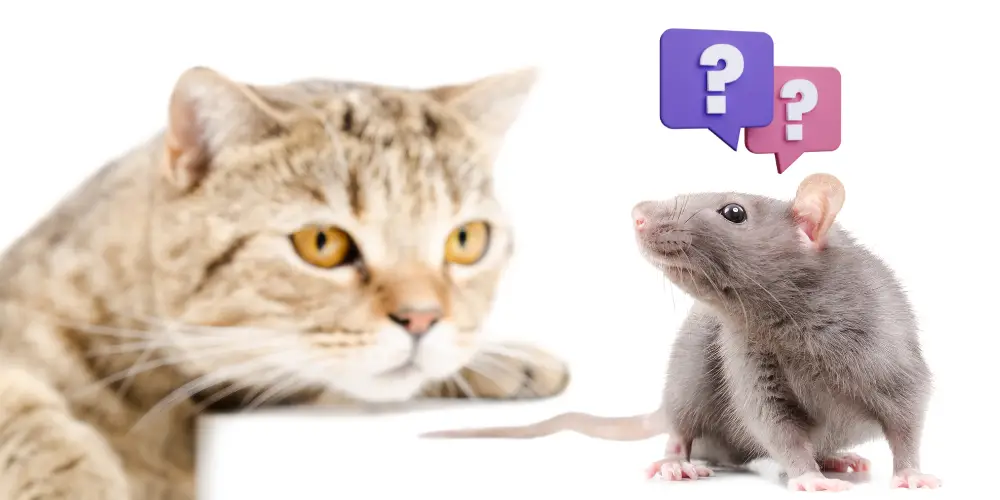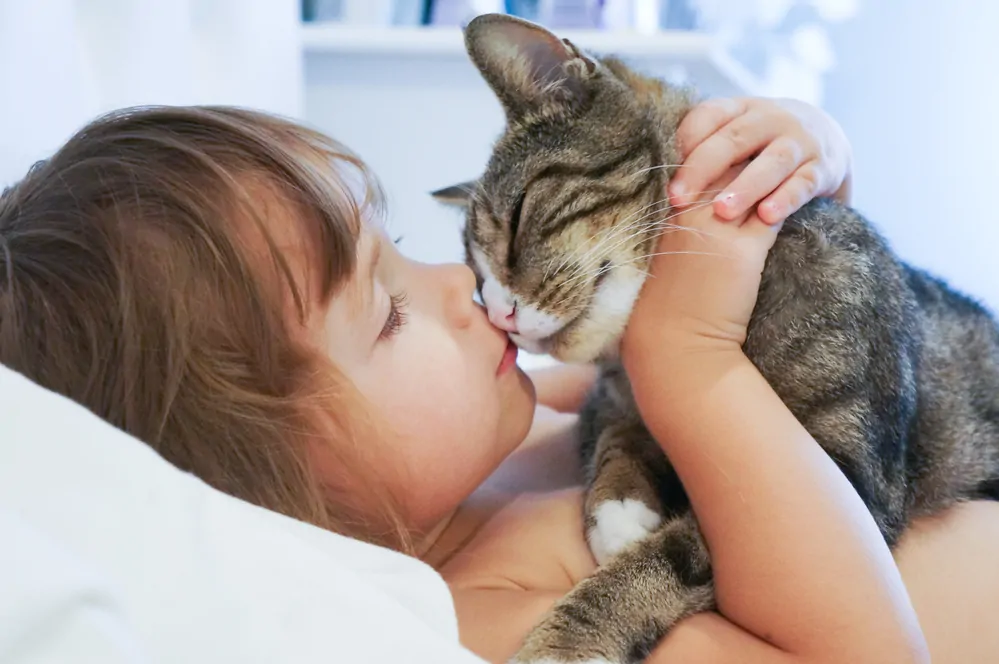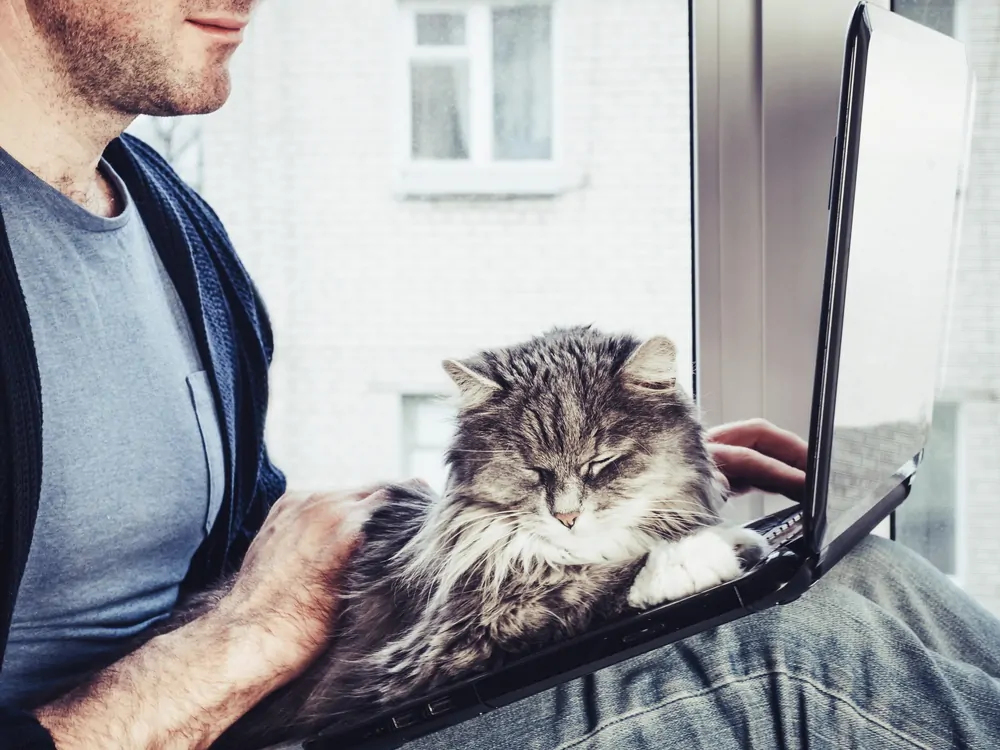The age-old relationship between cats and rats has always been a topic of intrigue. From cartoons to ancient folklore, cats are often depicted as the nemesis of rats.
But the central question remains: Do cats eat rats?
Cats are natural predators and often hunt and eat rats. However, domesticated cats might not always eat their prey, but they may still hunt for instinctual reasons. Always ensure your cat has a balanced diet and monitor its health if it consumes wild animals.
While many view cats as natural rat hunters, the reality is more nuanced. Interestingly, cats have a variety of behaviors and preferences, such as their fascination with flies.
Let’s dig deeper into this topic.
Key Takeaways
- Cats have a deep-rooted historical relationship with rats, often serving as protectors of grain stores.
- While cats possess innate hunting instincts, domestication has subtly altered these behaviors.
- Factors like hunger, past experiences, and upbringing influence cats’ decisions to consume prey.
- Domesticated cats hunt less for sustenance than feral cats, who rely more on their hunting skills.
- Consuming rats can expose cats to diseases like toxoplasmosis and risks of secondary poisoning.
- Rat poisons and chemicals present significant dangers to cats, necessitating owner vigilance.
- Modern alternatives, like toys and balanced diets, can simulate hunting behaviors without actual hunting.
- Training and early socialization can help reduce a domestic cat’s hunting propensity.
- The question “Do cats eat rats?” has a multifaceted answer shaped by nature, history, and modern environments.
Understanding the Cat’s Hunting Behavior
The enigmatic nature of cats is perhaps most evident in their hunting behaviors. While domesticated and often well-fed, their primal instincts frequently surface, especially regarding hunting.
Cats often display a dichotomy in their hunting habits. On one hand, they might hunt out of necessity, especially when food is scarce.
On the other, even well-fed domestic cats might hunt purely for the thrill of the chase. Before domestication, cats were solitary hunters that relied on their skills to catch prey for sustenance. The instinctual drive remained while the need to hunt for food diminished.
Several factors play a role in determining whether a cat will consume its prey:
- Hunger Level: A hungry cat is more likely to eat what it catches. In contrast, a cat that has just been fed might play with its prey without consuming it.
- Past Experiences: Cats learn from their experiences. A cat that has previously hunted and consumed prey might be more inclined to do so again. Conversely, a cat deterred or reprimanded for bringing prey home might be less likely to eat it.
- Upbringing: Kittens learn a lot from their mothers. A kitten that has observed its mother hunting and consuming prey might mimic this behavior as it grows. In contrast, kittens raised in an environment without exposure to hunting might be less inclined to hunt or consume prey.
While rats are a common target, especially given their size and movement patterns that trigger a cat’s predatory instincts, cats have a diverse palate for prey.
Birds, insects, and even larger rodents can fall victim to a cat’s hunting prowess. It’s also worth noting that some cats have been observed hunting snakes, showcasing their bravery and versatility.
A cat’s decision to hunt and whether or not to consume its catch is a complex interplay of instinct, experience, and environment.
Understanding this behavior provides a fascinating insight into the world of our feline companions.
Domestic Cats vs. Feral Cats:
The world of cats is vast and diverse, with each feline exhibiting unique behaviors based on its environment and upbringing.
One of the most striking distinctions in the feline world is between domestic cats and their feral counterparts.
Impact of Domestication on Hunting Behavior
Domestication has brought about significant changes in the behaviors of cats. House cats, pampered and well-fed, often have their hunting instincts subdued.
While they might engage in playful chases with toys or the occasional insect, their hunting sprees are more recreational than essential.
The comfort of a guaranteed meal often means that their predatory instincts are not driven by hunger but rather by playfulness or curiosity.
Feral Cats: Survivalists by Nature
In stark contrast, feral cats lead a life where survival is paramount. Without the assurance of regular meals, these cats rely heavily on their hunting skills to find food.
Whether it’s birds, rodents, or other small creatures, feral cats have honed their predatory instincts to ensure they don’t go hungry.
Their life in the wild, or urban jungles, has made them adept hunters, with every successful catch crucial for their sustenance.
Dietary Differences
The distinction between domestic and feral cats is also evident in their dietary habits.
With access to commercial cat food, domestic cats have a more balanced and consistent diet.
Feral cats, on the other hand, have a varied diet based on their catches, ranging from rats and birds to insects and other small animals.
Understanding group behaviors can be fascinating for those intrigued by the feline world’s social dynamics.
For instance, have you ever wondered what a group of cats is called? Such insights offer a glimpse into these enigmatic creatures’ intricate social structures and terminologies.
What Happens if a Cat Eats a Rat?
With their innate hunting instincts, cats often find themselves drawn to rodents, especially rats.
While this behavior might seem natural, consuming a rat can have various implications for our feline friends.
From potential health risks to nutritional concerns, cat owners need to understand the consequences of such actions.
Potential Health Risks
When a cat consumes a rat, it’s not just indulging its predatory instincts; it’s also taking on a series of potential health risks.
One of the primary concerns is the transmission of diseases. Rats can be carriers of various pathogens, and when a cat eats one, it becomes susceptible to these diseases.
Toxoplasmosis: This is a parasitic disease caused by the Toxoplasma gondii parasite.
While cats are the primary host of this parasite, they can get re-infected if they consume an infected rat.
Symptoms in cats can range from mild to severe, including respiratory and gastrointestinal issues.
Secondary Poisoning: If a rat has consumed poison and is eaten by a cat, there’s a risk of secondary poisoning.
This can be particularly dangerous if the rat has ingested rodenticides, which can cause internal bleeding, kidney failure, or even death in cats.
Nutritional Concerns
From a nutritional standpoint, while rats provide some protein, they aren’t a balanced meal for cats.
Domesticated cats require a diet that includes specific vitamins, minerals, and amino acids, which a rat might not adequately provide. Consuming rats regularly could lead to nutritional imbalances in the long run.
Expert Opinions
Many veterinarians and feline experts caution against letting cats consume their rodent prey.
Apart from the health risks mentioned above, there’s also the potential for physical harm.
Rats have sharp teeth and claws; a cat could get injured in a struggle.
Additionally, if a cat consumes the entire rat, there’s a risk of ingesting indigestible parts like bones, which could lead to gastrointestinal blockages.
In light of these concerns, cat owners should monitor their pets’ outdoor activities and, if possible, prevent them from hunting or consuming rats.
If a cat is observed eating a rat, it’s essential to monitor the cat for any signs of illness and consult a veterinarian if any symptoms arise.
Safety Considerations for Cat Owners
The bond between cat owners and their feline companions is profound. Naturally, ensuring the safety and well-being of these beloved pets is paramount.
One of the lurking dangers for cats, especially those with outdoor access, is the potential exposure to rat poisons and other harmful chemicals.
The Danger of Rat Poisons
Rat poisons, or rodenticides, are designed to kill rodents by affecting various physiological systems. However, these poisons are not specific to rats alone.
Cats that ingest these chemicals directly or indirectly by consuming a poisoned rat can suffer severe health consequences.
Poisoning symptoms can range from lethargy, difficulty breathing, and loss of appetite to more severe manifestations like internal bleeding or neurological issues.
Secondary Poisoning: A Hidden Threat
Secondary poisoning occurs when a cat consumes a rat that has ingested poison.
Even if the cat doesn’t directly consume the poison, the toxins within the rat’s body can harm the cat.
This form of poisoning can be insidious, with symptoms sometimes taking time to manifest, making it crucial for cat owners to observe any behavioral changes in their pets.
Other Chemical Hazards
Other chemicals commonly found in gardens or households besides rat poisons can pose risks.
Pesticides, herbicides, and certain fertilizers can be harmful if ingested. With their grooming habits, cats can easily ingest these chemicals if they come into contact with them.
Proactive Measures for Cat Owners
To ensure their cats’ safety, owners should:
- Regularly inspect their gardens or outdoor spaces for signs of rat poison or other chemicals.
- Store all chemicals, including rodenticides, in secure locations away from a cat’s reach.
- Monitor their cat’s health and behavior, especially after outdoor excursions, and consult a veterinarian if any signs of poisoning are observed.
- Consider creating a safe outdoor enclosure or ‘catio’ to allow cats to enjoy the outdoors without the associated risks.
By being vigilant and proactive, cat owners can provide a safe environment for their feline friends, ensuring they remain protected from the hazards that might be present outdoors.
Historical Context
Throughout time, cats have held a special place in human societies. Their presence can be traced back to ancient civilizations, where they were cherished as companions and respected for their prowess as hunters.
Cats in Ancient Civilizations
In ancient Egypt, cats were revered and considered sacred. They were associated with the goddess Bastet, who was depicted as a lioness or a woman with the head of a lioness.
Cats were believed to have protective qualities, and their primary role was to safeguard granaries from rodents, especially rats.
The Egyptians recognized the cat’s natural ability to control the rat population, which was essential for preserving their food supplies.
Cats in Medieval Europe
Similarly, in medieval Europe, cats were indispensable in farms and villages.
Their agile bodies and sharp predatory instincts made them the first line of defense against rats and mice.
These rodents not only threatened food stores but were also carriers of diseases. Cats, with their natural behaviors of stalking, pouncing, and capturing prey, were the perfect solution to this menace.
The Impact of Domestication
As societies evolved and urbanized, the role of cats began to shift. The domestication process, which spanned centuries, brought about subtle changes in their behaviors.
While their hunting instincts remained intact, domesticated cats became more accustomed to human companionship and less reliant on hunting for sustenance.
This transition can be observed in how many modern domestic cats play with their prey rather than consume it.
While rats are a common target, cats’ diverse hunting behaviors also extend to other creatures.
For instance, it’s common to hear tales of cats hunting snakes. In some cultures, a cat’s ability to confront and capture snakes is a testament to its bravery and agility.
Final Thoughts
The age-old question, “Do cats eat rats?” has intrigued many for centuries.
This relationship between cats and rats is multifaceted and deeply rooted in nature, history, and our modern environments.
Historically, cats have been celebrated for controlling rat populations, a testament to their innate hunting prowess.
While many cats still exhibit this predatory behavior today, the dynamics have shifted due to domestication and urban living.
The answer to “Do cats eat rats?” isn’t a simple yes or no. While some cats might indulge in their instincts and consume rats, others might merely play with them or be deterred by modern living conditions.
For cat owners, understanding and respecting these natural behaviors is paramount. It’s essential to strike a balance, appreciating the depth of their instincts while ensuring their safety and well-being.
By providing stimulating environments, toys, and a balanced diet, we can channel their hunting instincts safely and constructively, ensuring that the age-old dance between cats and rats continues in harmony.
FAQs: Common Questions About Cats and Rats
Will cats eat dead rats?
While some cats might show interest in dead rats, many prefer to play with them rather than consume them. The cat’s behavior can vary based on individual preferences and experiences.
Do cats scare away rats?
Yes, the presence of cats can deter rats. Rats have an innate sense of danger regarding predators like cats.
Even if a cat doesn’t actively hunt rats, its scent and occasional presence can be enough to keep rats at bay or make them think twice about venturing into
Do cats eat rats whole?
It’s uncommon for domestic cats to eat rats whole. While they might nibble on parts of the rat, they often leave behind the carcass.
On the other hand, feral cats might be more inclined to consume more of their catch due to survival instincts.
REFERENCES:
- Mahlaba, A. M., Monadjem, A., McCleery, R., & Belmain, S. R. (2017). Domestic cats and dogs create a landscape of fear for pest rodents around rural homesteads. PLoS ONE, 12(2). https://doi.org/10.1371/journal.pone.0171593
- Atlas Obscura. (2020, December 30). Meet the Rats That Wear Protective Poison Armor. Retrieved from https://www.atlasobscura.com/articles/rats-poison-protective-armor
- Storiespub.com. (2023, March 11). Top Cat And The Rat Stories. Retrieved from https://storiespub.com/cat-and-rat-stories/
- The New York Times. (2007, December 21). To Dismay of Inspectors, Prowling Cats Keep Rodents on the Run at City Delis. Retrieved from https://www.nytimes.com/2007/12/21/nyregion/21cats.html
- The Atlantic. (2018, September). Cats vs. Rats: New York’s Struggle to Tame Rodents. Retrieved from https://www.theatlantic.com/science/archive/2018/09/cats-vs-rats-new-york/571414/
- CNN. (2016, July 15). Chicago deploys feral cats to tackle rat problem. Retrieved from https://edition.cnn.com/2016/07/15/health/cats-chicago-rat-patrol/index.html



